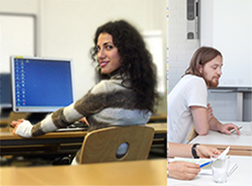After being accepted as a doctoral candidate, you research the doctoral topic and write the dissertation. According to the doctoral agreement, the supervisor and doctoral candidate discuss the progression of the doctorate at least once each semester based on the research proposal and interim reports. These discussions are to be documented. In addition, the doctoral candidate independently and regularly informs the supervisor about progress on the doctorate.
Good scientific practice
The generally recognized principles of good scientific practice include, in particular:
- working according to the recognized rules of the scientific discipline (lege artis),
- being open to professional criticism and questioning the results of one’s own scientific work,
- respecting the creative contributions of others,
- documenting research results and ensuring their verifiability,
- prioritizing the quality of scientific work over its quality,
- supporting early-career researchers,
- avoiding and preventing scientific misconduct.
Further information on the principles of good scientific conduct can be found in the Guidelines for Ensuring Scientific Integrity and Good Scientific Practices at the University of Hohenheim (PDF, 297 kB).
The doctoral regulations of 5 September 2023 state that it is mandatory to attend at least one training course on good scientific practice. The Graduate Academy regularly holds workshops on this topic.
There are also online courses where you can find out for yourself about good scientific practice (based on the “Guidelines for Ensuring Good Scientific Practice” issued by the German Research Foundation (DFG), or the European Code of Conduct for Research Integrity):
- E-learning course on “Good Research Practice during Doctoral Studies” provided by GRADE, the (post)graduate academy of Goethe University, Frankfurt am Main (with completion certificate)
To get full access to the course, please send an email to galeitung@uni-hohenheim.de - Open courses KIT “Onlinekurs Gute wissenschaftliceh Praxis” or “Online Course Good Research Practice”
Access to the course is via ILIAS. - “Upright” online course as part of the EU PRINTEGER project – Promoting Integrity as an Integral Dimension of Excellence in Research (available in English only)
Plagiarism check
When submitting their dissertation, all doctoral candidates consent to a “Turnitin” plagiarism check being carried out if plagiarism is suspected (see “Declaration for the digital version of the dissertation”). Further information about the plagiarism checker and access to “Turnitin”
Ombud system
Ombudspersons act as impartial arbitrators. Their responsibilities include the documentation of serious suspicions or accusations, and bringing these to the attention of the relevant academic institution. If requested, they can also mediate in cases of conflict. The ombudspersons work in strict confidence and completely independently. However, there is an exception to confidentiality if it is necessary to pass on the information entrusted to them to prevent significant harm to the University of Hohenheim, its members, or third parties.
At the University of Hohenheim, elected ombudspersons serve as
- Moderators in the event of conflicts arising in graduate education
- Contact persons for compliance with the rules of good scientific practice
In the context of structured doctoral programs, participation is also required in additional qualification measures.
In general, the many continuing education measures offered by the University of Hohenheim are open to doctoral candidates, e.g. courses by F.I.T., the University Didactics Center (HDZ), the Language Center, or KIM’s continuing education courses on media and IT.
Doctoral candidates are encouraged to deepen their academic and interdisciplinary skills during this qualification period. The University of Hohenheim also offers its doctoral candidates many different continuing education programs:
| Courses on the continuing education platform F.I.T. | With respective continuing education courses for doctoral candidates, you can get information on F.I.T. and register if you are interested in a course. |
Courses from the University Didactics Center (HDZ) | The HDZ supports you in developing your teaching competency. The offers include advising, courses, and certifications. |
| Offers from the Language Center | The University of Hohenheim’s Language Center gives you the opportunity to expand and deepen your language skills. Courses, workshops, and tandem programs offer something for everyone. |
| Offers from KIM | KIM provides the University with IT services, literature, and other media. In the context of this task, it offers continuing education courses for University members. |
There are possibilities to network in e.g. the Graduate Council. The Graduate Academy is currently preparing offers to network the doctoral candidates.

